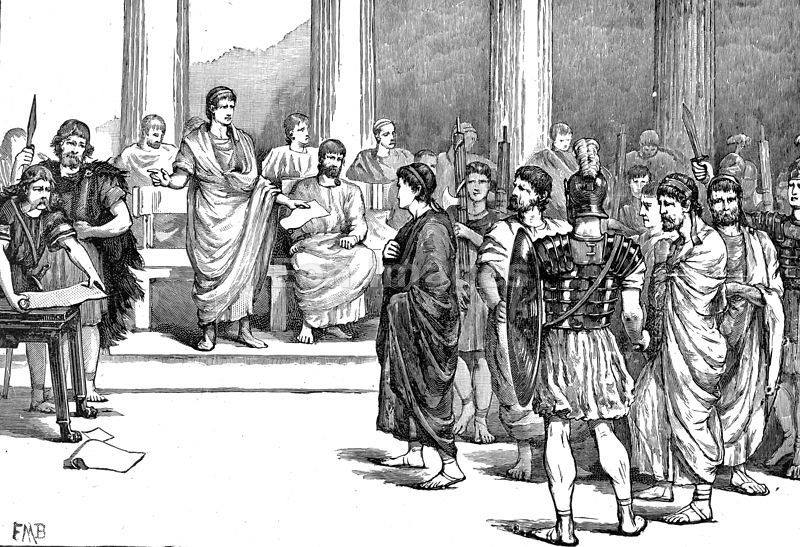Historical Context
The Catilinarian Conspiracy occurred in 63 BC during a time of great political turmoil in the Roman Republic. Lucius Sergius Catilina, known as Catiline, was a senator who had lost the election for consul. In response, he allegedly plotted to overthrow the government, revealing the intense rivalry among Roman political elites and the struggles for power within the Republic.

Cicero Denounces Catiline in the Roman Senate – Source: Wikipedia
Key Figures
The conspiracy predominantly involved Catiline and notable figures such as Cicero, the consul at the time, who played a crucial role in exposing the plot. Other conspirators included prominent patricians and disaffected veterans of the Roman military. Understanding these figures provides a clearer view of the dynamics at play during this historical event.

Detail of Cicero Denouncing Catiline – Source: Wikipedia
The Plot Unveiled
Cicero, upon learning of Catiline’s plans for violence, including assassination and arson, delivered a series of speeches known as the Catilinarian Orations, which rallied the Senate and public against Catiline. His ability to articulate the threat posed by Catiline not only sought to safeguard the Republic but also cemented Cicero’s reputation as a defender of the state.

The Conspirators of the Catiline – Source: Imperium Romanum
Outcomes and Consequences
The conspiracy ultimately failed when the Senate took decisive action, leading to the arrest and execution of several conspirators. This event greatly influenced Roman politics, instigating a period of fear and suspicion that would alter public perception of political dissent and had long-lasting effects on the Republic’s governance.
Cultural and Historical Legacy
The Catilinarian Conspiracy is often viewed as a turning point in Roman history. It highlighted the fragility of the Republic and foreshadowed the civil strife that would culminate in the decline of the Roman Republic. The events surrounding this conspiracy have inspired literature and political discourse, with themes of power, betrayal, and the moral implications of leadership continuing to resonate in modern discussions about governance.
References:
Catilinarian conspiracy – Wikipedia – link
Cicero & the Catiline Conspiracy – World History – link
Categories: Ancient Civilizations, History, Political History, Roman Empire, War History
Tags: Ancient Rome, Catiline, Cicero, Conspiracy, Political History, Roman Republic, Roman Senate
Religion: Roman Paganism
Country of Origin: Italy, Roman Empire
Topic: Historical Events
Ethnicity: Roman

